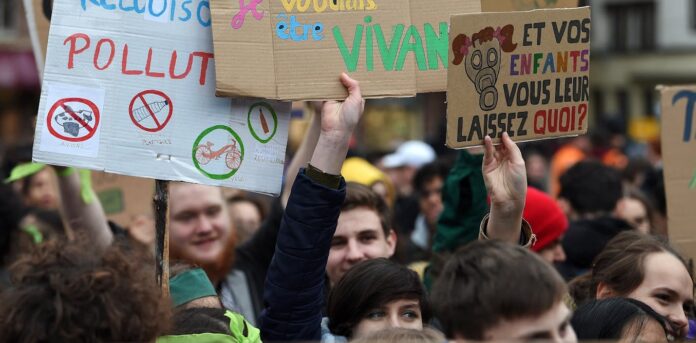Contrary to popular belief, eco-anxiety is not an illness, but an emotional reaction adapted to environmental issues. Young people and other groups with little power in society are most affected. Taking collective action helps overcome concerns.
In a world facing a growing climate crisis, a new phenomenon is emerging: eco-anxiety. Often misunderstood and sometimes wrongly considered a diseaseeco-anxiety is in reality a normal and adapted reaction to environmental reality and in particular climate change.
Let’s take a closer look at what eco-anxiety really means, why it particularly affects certain groups, and how to deal with it constructively.
Every Tuesday, our newsletter “And above all health!” » gives you the keys to making the best decisions for your health (sleep, diet, psychology, physical activity, new treatments, etc.)
Subscribe today.
Emotions linked to ecological loss
Eco-anxiety can be defined as the set of emotional reactions, mainly negative but sometimes also positive, linked to the fear of environmental collapse and ecological loss. These are the emotions we experience in the face of the degradation of our planet and the realization that certain changes will be irreversible.
So, according to this study from Yale University in the United States:
“65% of Americans say they are at least “somewhat worried” about global warming. Among them, 29% say they are “very worried.” About one in ten Americans report experiencing symptoms of anxiety or depression because of global warming for several days or more in the past two weeks. »
Eco-anxiety presents many similarities with the grieving process. As with loss, it involves phases of disbelief, sadness, anger, and sometimes guilt or shame. This process takes time to go through and can lead to personal transformation.
However, eco-anxiety should not be confused with the situations experienced by populations who suffer from anxiety, depression or even post-traumatic disorders because their living environment is disappearing due, in particular, to disruption climate.**
A healthy reaction, not an illness
Indeed, contrary to popular belief, eco-anxiety is not an illness. Specialists, notably the American Psychological Association (APA), consider it a healthy and appropriate reaction to a worrying environmental reality. In 2016-2017, the APA clearly established that eco-anxiety is not pathological, but corresponds to a normal response to current environmental challenges.
The tendency to medicalize eco-anxiety can be seen as a way of individualizing and minimizing the problem. By considering it as a disease, we risk diverting attention from the real environmental issues and the need for collective action.
Which groups are most affected?
Studies show that, in the population, certain groups are more likely to experience eco-anxiety and to feel concerned about climate justice issues:
-
Young people: they are particularly concerned because they will be the most affected by the consequences of climate change in the long term. Additionally, they often have limited power to influence current decisions.
-
Ethnic minorities: in certain countries such as the United States, Black and Hispanic populations are more worriedaware that they risk being more impacted by the consequences of climate change.
-
Women: they tend to express more concern about environmental issues.
-
Low-income people: they are more vulnerable to the impacts of climate change and have fewer means to adapt to it.
This distribution of eco-anxiety reflects existing social inequalities and highlights that the groups with the least power in society are also those who worry the most about the consequences of climate change.
The reflection of social injustice
It is crucial to understand that eco-anxiety is not simply an individual problem, but a reflection of broader social injustice. Climate inaction can be seen as a form of social violence, particularly towards the younger generations whose future is most threatened.
This perspective allows us to make a parallel with other forms of social oppression. Just as sexism, racism or homophobia can affect the mental health of marginalized groups, inaction in the face of climate change generates discomfort among those who suffer or will suffer its consequences the most.
The positive impact of collective climate actions
How to deal with eco-anxiety? Contrary to what one might think, the solution to eco-anxiety does not necessarily lie in an individual medical or psychological approach. Research shows that engaging in collective climate action is the most effective answer, especially for young people.
Participating in group initiatives allows you to feel less isolated in the face of these concerns, to share your concerns with people who understand them, to act concretely and have a more significant impact and also to develop a feeling of effectiveness and control.
For example, engaging in a collective thermal insulation project for a building will have a greater and more satisfying impact than isolated individual eco-gestures.
Studies show that engaging in collective actions is associated with better mental healthwith fewer symptoms of depression, anxiety and eco-anxiety.
The role of health professionals
Faced with eco-anxiety, the role of health professionals is not to “treat” an individual disorder, but rather to recognize the legitimacy of these concerns and to guide people towards constructive collective actions.
It is important for healthcare professionals to understand that eco-anxiety is a symptom of a broader societal malaise. Their responsibility is to validate these concerns and encourage engagement in collective initiatives rather than only proposing individual solutions.
Transform worry into driving force
Eco-anxiety is not a disease to be cured, but an understandable reaction to the climate crisis. It reveals awareness of environmental issues and can be a driving force for collective action.
Rather than seeking to “treat” eco-anxiety, we should see it as a call to action. It invites us to rethink our relationship with the environment and to commit collectively to a more sustainable future.
By recognizing eco-anxiety as a legitimate response and encouraging collective action, we can transform this worry into a driving force for positive change. It is by acting together that we can not only alleviate our anxiety, but also contribute concretely to the preservation of our planet.

